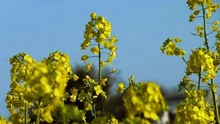
Shabbir Hussain, KVK Adhikari from Leh-Ladakh visited Krishi Jagran Head Office in New Delhi. As a Subject Matter Specialist in Fruit Science at KVK Leh, Ladakh, he shared his expertise and insights on fruit cultivation in high-altitude regions along with challenges affecting Ladakhi Farmers. Upon arriving, Shabbir Hussain was warmly welcomed by Pankaj Khanna, Senior Content Manager, with Shiny Dominic, Managing Director, presenting a small plant as a gesture of affection and good fortune.
Following his visit, Shabbir Hussain engaged in a productive discussion with Vivek Kumar Rai, Hindi Content Head, and Shivam Dwivedi, Senior Sub-Editor, shedding light on Ladakh's agricultural landscape and the pivotal role of Krishi Vigyan Kendra (KVKs) in fostering agricultural growth.
Challenges of Geographic Dispersion:
Shabbir Hussain emphasized the geographical challenges faced by Ladakh's agriculture, with vast and scattered villages spanning across altitudes ranging from 9000 to 18000 feet. He highlighted the necessity of multiple KVKs, each serving a district, to adequately support farmers due to the time-consuming travel between villages and limited resources.
Highlighting the significance of KVK-Padum, Hussain noted the critical role it plays in supporting farmers, especially in horticulture. With a team of five scientists, KVK-Padum provides essential guidance and assistance to farmers in fruit and vegetable cultivation, addressing the unique challenges of Ladakh's high-altitude farming.

Impact of Higher Altitudes on Crop Production
Hussain explained how altitude variations affect crop production in Ladakh. While lower-altitude villages boast excellent fruit yields, higher-altitude regions face diminished production due to unsuitable micro-climates and lower atmospheric temperatures. He emphasized the distinct characteristics of temperate fruits grown at higher altitudes, citing challenges such as irrigation needs and sugar concentration in fruits.
Despite challenges, Ladakh cultivates a diverse range of horticultural crops including apples, apricots, pears, peaches, plums, grapes, walnuts, almonds, and cherries, alongside vegetables like capsicum, tomatoes, and melons. Hussain underscored the importance of technology interventions such as protected structures like greenhouses to create favourable growing conditions, especially in regions with growth challenges.
Farmer Challenges: Awareness and Support
Hussain discussed common challenges faced by Ladakh's farmers, including a lack of awareness about technologies, government schemes, optimal seed rates, and fertilizer recommendations. He emphasized KVK's role in providing on-farm training, awareness campaigns, and access to quality seeds and technological interventions to address these challenges and improve soil fertility.
While Ladakh spans around 60,000 square kilometres, cultivable land remains limited, averaging around one acre per farmer. Hussain discussed the importance of land reclamation techniques to enhance soil fertility and productivity, enabling agriculture in barren lands. He highlighted government schemes providing high-quality seeds and protected structures to support farmers' livelihoods.

Crop Cultivation Practices and Seasonality
Traditional crops like wheat, barley, and buckwheat are cultivated in specific regions of Ladakh, with varying ease of growth depending on altitude. At lower elevations, these crops thrive more readily compared to altitudes of 12,000 feet. Higher regions focus on shorter-season crops. Rabi crop sowing typically commences from late March to early April and extends until mid-May, with harvesting taking place between August and September. Sea Buckthorn fruit holds significant popularity domestically and internationally, receiving a Geographical Indication (GI) tag. Known as the 'Wonder Plant,' 'Ladakh Gold,' or 'Golden Bush' of cold deserts, Sea Buckthorn contributes to Ladakh's agricultural diversity with its rich Vitamin C content.
Challenges faced by farmers in Ladakh include limited awareness of technologies and government schemes, attempts to cultivate crops unsuitable for the local climate, insufficient knowledge of optimal seed rates, and unclear understanding of fertilizer recommendations.
“Our Krishi Vigyan Kendra (KVK) plays a pivotal role in empowering farmers with essential knowledge and skills for successful farming practices in Ladakh. Through our initiatives, farmers are educated on crucial aspects like crop selection, proper fertilizer application, and optimal seed rates. On-farm training sessions conducted directly on agricultural land are proving to be particularly effective in imparting practical know-how. Moreover, the region's soil fertility challenges, stemming from low organic content and microbial population due to harsh temperatures, are addressed through our concerted efforts. We conduct extensive awareness campaigns and provide farmers with high-quality seeds and technological interventions to overcome these obstacles, ensuring sustainable agricultural development in Ladakh,” he said.
Shabbir Hussain's insights underscore the importance of collaborative efforts, technological interventions, and knowledge dissemination in unlocking Ladakh's agricultural potential and enhancing farmers' livelihoods.












